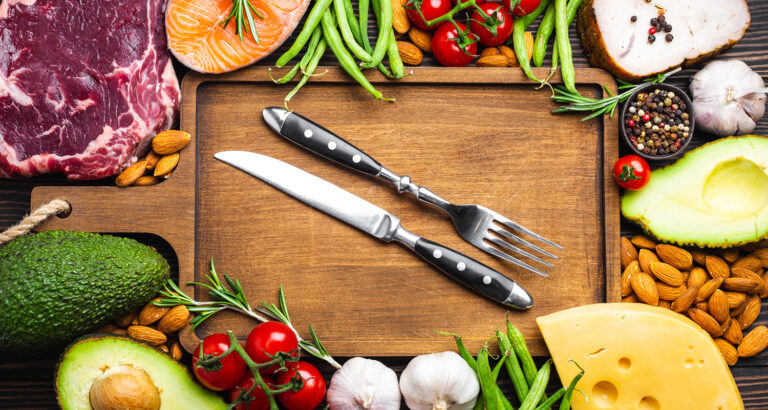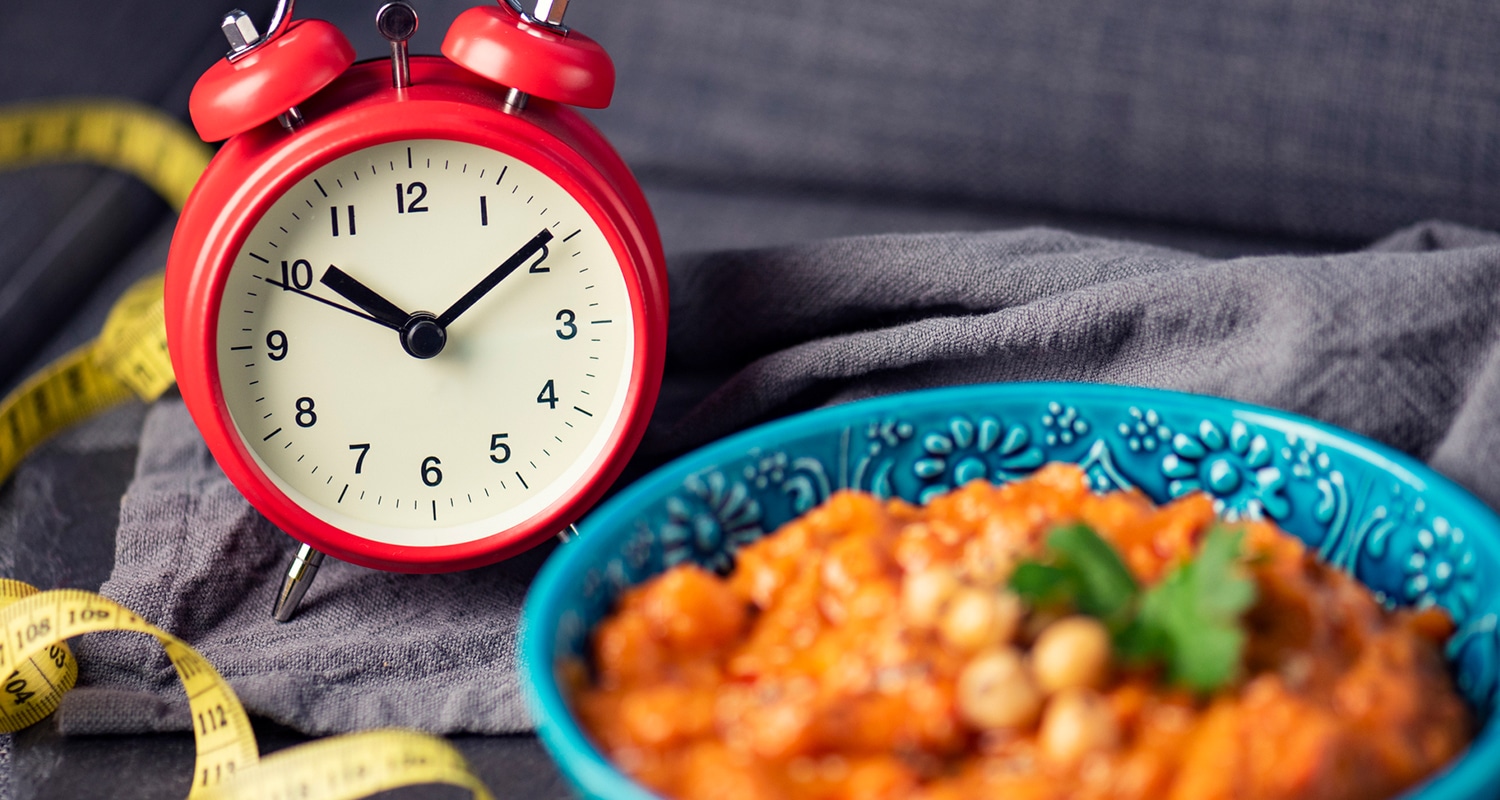
[tldr]
- The keto diet is a high-fat, low-carb style of eating. It places your body in ketosis, a state in which you burn fat for energy instead of carbs.
- The keto diet is safe and effective, but like any diet, there is no one-size-fits-all approach.
- Below, get answers to frequently asked questions about keto, including tips and resources to feel your absolute best.
[/tldr]
Eat fat to burn fat and lose weight. It sounds counter-intuitive, but this principle is the foundation of the ketogenic diet — a high-fat, low-carb eating style followed by celebrities like Halle Berry and elite athletes like LeBron James. Whether you’re thinking about starting keto or you’re five weeks in, here’s your guide to all things keto, including answers to common questions, and tips to get the best keto results.
Getting started on keto
1. What is the keto diet?
The keto diet is a high-fat, low-carb style of eating that puts your body into ketosis, a state in which you burn fat instead of carbs for energy. There are tons of benefits of keto, including weight loss, improved energy and focus, reduced inflammation.[ref url=”https://www.ncbi.nlm.nih.gov/pmc/articles/PMC4124736/#S4title”] [ref url=”https://www.ncbi.nlm.nih.gov/pubmed/16807920″] [ref url=”https://www.ncbi.nlm.nih.gov/pubmed/21489321″] To get the full story on what the keto diet is and how to get started, check out this essential keto diet for beginners guide.
2. How many carbs do I eat on keto?
In order to stay in ketosis and reap all the fat-burning benefits of the keto diet, you need to restrict your carb intake. The Bulletproof Diet recommends eating fewer than 50 grams of carbs per day, but all diets are different. Some keto diets advocate no more than 20 grams of carbs per day.
Because the Bulletproof Diet uses keto diet hacks like intermittent fasting and MCT oil to keep you in ketosis, you can generally eat more carbs than you would on a standard keto diet. But keep in mind that this number can vary based on your biology, activity level, age, goals and gender. Here’s how to determine how many carbs on keto you should be eating.
3. What foods should I eat on the keto diet?
For the best results on keto, stick to these principles:
- An abundance of high-quality fats, like grass-fed butter and ghee, MCT oil, avocado oil, and virgin coconut oil
- Moderate amounts of fatty proteins, like grass-fed meat, pastured eggs, wild-caught fatty fish, and collagen protein.
- Lots of nutrient-dense and low-carb vegetables, like organic broccoli, zucchini, avocado, cucumbers, cabbage, and celery.
For a more detailed guide on what to eat on the keto diet, check out this downloadable complete keto food list. Take it with you to the grocery store.
Download the free 7-Day Keto Meal Plan & Keto Recipes for Beginners Cookbook now
4. What is the keto flu?
If after a few days of embarking on the keto diet, you start feeling off — like you’re getting sick, welcome to the keto flu. Learn about keto flu symptoms here, how long it lasts, and how to deal with it. Tip No. 1: Stay hydrated.
Other temporary side effects of the keto diet may involve stomach issues, like constipation or diarrhea, and keto rash. This skin condition, also known as Prurigo pigmentosa, is super rare.
5. How do I know if I’m in ketosis?
It can take anywhere from 2-3 days to a few weeks to enter ketosis, depending on your body’s ability to adapt to burning fat for fuel. Once you enter ketosis, your body will naturally produce ketones — molecules that fuel your brain and body with fat, not carbs.
You can usually tell if you’re in ketosis if you have steady, lasting energy, better focus, and a reduced appetite. For definitive answers, test your blood ketone levels. Get all the details here on the best ways to measure ketones, and how to know if you’re in ketosis or not.
6. Do I need to calculate macros, and how do I count them?
Macros, or macronutrients, are the carbs, fats, and protein that make up your food and help you create energy. It’s not essential to count macros on the keto diet, but it’s a useful way to learn more about your food and understand your body’s needs. Learn more about ideal keto macros, including the benefits (and drawbacks) of counting them.
7. And what about net carbs?
Even if you don’t calculate macros, you should keep track of net carbs — the carbs your body actually uses for energy. Calculating net carbs can help you stay in ketosis and inform your food choices. Find out how to calculate net carbs on keto and how many net carbs vs. total carbs you need.
8. Is the keto diet healthy?
The ketogenic diet is healthy, effective, and backed by science, with a few caveats that we’ll get into in a moment. When done properly, the keto diet has been shown to support weight loss, create more mitochondria in your brain, reduce inflammation, and even combat metabolic syndrome diseases like diabetes.[ref url=”https://www.ncbi.nlm.nih.gov/pubmed/23651522″] [ref url=”https://www.ncbi.nlm.nih.gov/pubmed/16807920″] [ref url=”https://www.sciencedirect.com/science/article/abs/pii/S1871402116303137?via%3Dihub”] However, any diet can be good or bad for you, depending on what you put on your plate. If you stick to the Bulletproof Diet roadmap, you eliminate technically keto foods that make you feel like crap and don’t belong in a healthy diet. Here are some of the worst keto foods to eat.
9. What about “dirty keto?”
That brings us to dirty keto, which follows the same high-fat, low-carb structure of the standard keto diet — but it allows processed, packaged, and fast foods. It’s still possible to enter ketosis and burn fat while you’re on dirty keto, but it has serious drawbacks like inflammation and weight gain. Here are the facts about dirty keto, and why you should avoid it.
10. Will keto spike my cholesterol?
Eating more saturated fat can increase your HDL “good” cholesterol, total cholesterol, and sometimes even your LDL cholesterol — and contrary to popular belief, that’s a good thing if you’re eating high-quality fat. Confused? Here’s what you should know about high cholesterol, saturated fats, and low-carb diets.
11. Does the keto diet cause diabetes?
No, keto does not cause diabetes. Several studies have found that ketosis can even reverse diabetes because it decreases glucose intolerance and stabilizes blood sugar.[ref url=”https://www.ncbi.nlm.nih.gov/pmc/articles/PMC3867584/”] [ref url=”https://www.ncbi.nlm.nih.gov/pubmed/25071075/ “] [ref url=”https://www.ncbi.nlm.nih.gov/pmc/articles/PMC1325029/”]
12. Is the keto diet sustainable long-term?
Yes and no. Some people thrive on the full keto diet without any problems. Other people run into issues from restricting carbs long-term, like insomnia and hormone imbalances. If that’s the case, experiment with keto carb cycling (aka cyclical ketosis), where you eat a moderate amount of carbs one day a week, so your body can cycle in and out of ketosis. It’s an effective modification that helps many people avoid any potential dangers and risks of a keto diet. Here’s how to do a keto carb cycling diet, and whether it’s right for you.
13. What are the different types of keto and how do I know which is right for me?
If you aren’t enjoying full keto, or you’re struggling with issues like insomnia and chronic fatigue, experiment with other styles of the keto diet.
On cyclical keto, you spend one day each week eating more nutrient-dense carbs to fuel your body’s systems.
On targeted keto diet (TKD), you time your carbs around your workouts and periods of high stress for extra fuel.
Troubleshooting keto
14. How do I know if I need more carbs?
Some people feel fine when they eat very few carbs for extended periods of time. But if you’re dealing with symptoms like dry eyes, insomnia, fatigue, and mood swings, your body might be asking for more carbs — especially if you’re a woman, an athlete, or dealing with lots of stress. Learn more about the benefits of experimenting with your carb intake.
15. Why aren’t I losing weight on keto?
You might be eating too much, not enough, or the wrong foods altogether. Here are seven reasons you’re not losing weight on keto — and what to do about it.
16. How does MCT oil work with keto?
MCT oil is a powerful tool on the ketogenic diet because it helps your body produce more ketones and stay in ketosis, so even if you eat a few more carbs than usual, you won’t fall out of ketosis. However, not all MCT oils are the same, and some are more effective than others. Here’s a guide to MCT oil and keto.
17. Should I be taking exogenous ketones?
Exogenous ketones are synthetic ketones that help raise ketone levels in your blood. They’re popular supplements, but definitely not required — instead, focus on eating enough high-quality fats. Your body will naturally produce all the ketones you need to power through your day. If you want to add a supplement to your keto diet, MCT oil is a great place to start.
18. Should I try intermittent fasting?
Definitely. Intermittent fasting can actually make keto more effective by boosting your fat burn and weight loss results. Learn more about keto and intermittent fasting.
Ready to start whipping up keto dishes of your own? Check out the Bulletproof Recipes page for a full list of keto recipes, including keto shrimp scampi and easy keto casserole recipes.












